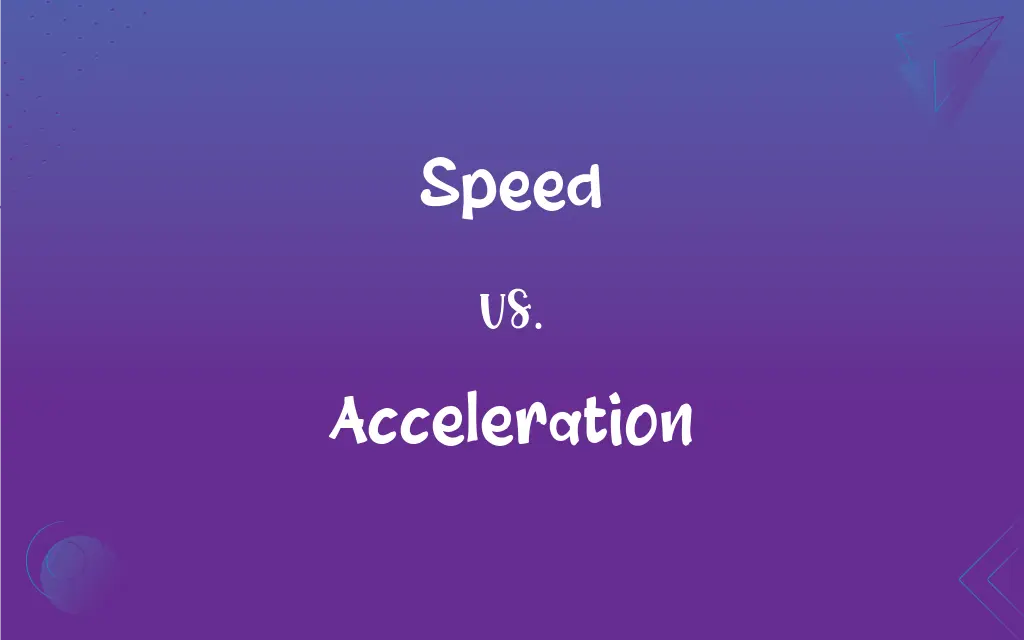Speed vs. Acceleration: What's the Difference?
Edited by Aimie Carlson || By Harlon Moss || Published on February 19, 2024
Speed is the rate of change of distance with time, whereas acceleration is the rate of change of speed with time.

Key Differences
Speed is a scalar quantity representing how fast an object is moving, calculated as distance divided by time. Acceleration, on the other hand, is a vector quantity that measures the rate at which an object changes its speed, indicating both the magnitude and the direction of this change.
Acceleration involves a change in speed, whether it's an increase or a decrease. Speed is simply the magnitude of the distance an object covers over a specific time period, irrespective of its direction.
Speed gives no information about the direction of movement, simply quantifying how fast something is moving, while acceleration is directional, indicating how the speed of an object is increasing or decreasing in a particular direction.
Acceleration can occur even when the speed is constant if there is a change in direction, as seen in circular motion. Here, speed remains constant, but the direction changes, resulting in acceleration.
In practical terms, when a car maintains a constant speed, it is not accelerating. However, any change in the car's speed, either speeding up or slowing down, represents acceleration.
ADVERTISEMENT
Comparison Chart
Definition
Rate of distance covered over time.
Rate of change of speed over time.
Type of Quantity
Scalar (magnitude only).
Vector (magnitude and direction).
Indication of Direction
Does not indicate direction.
Indicates direction of speed change.
Units
Meters per second (m/s), mph, etc.
Meters per second squared (m/s²).
Change in Value
Constant or varies without direction.
Involves directional change.
ADVERTISEMENT
Speed and Acceleration Definitions
Speed
Speed is a measure of how quickly an object moves from one place to another.
He ran with a speed of 10 meters per second.
Acceleration
Acceleration refers to the rate of change of velocity per unit of time.
The roller coaster's acceleration down the slope was exhilarating.
Speed
Speed is the distance traveled per unit of time.
The car traveled at a speed of 60 mph.
Acceleration
Acceleration can also mean a vehicle's capacity to gain speed.
The bike's acceleration was smooth and quick.
Speed
Speed is the rate at which someone or something is able to move or operate.
The speed of the computer processor was impressive.
Acceleration
Acceleration is the increase in the rate or speed of something.
The car's acceleration from 0 to 60 mph was remarkable.
Speed
Speed in everyday language refers to rapidity of movement.
The speed of the wind increased rapidly.
Acceleration
In physics, acceleration is a vector quantity, representing a change in velocity.
The ball experienced acceleration as it rolled downhill.
Speed
Speed also refers to the setting of a shutter in photography, determining exposure time.
He adjusted the shutter speed to capture the moving car.
Acceleration
Acceleration can describe a sudden increase in activity or growth.
The acceleration of the project's development surprised everyone.
Speed
Distance traveled divided by the time of travel.
Acceleration
The act of accelerating.
Speed
The limit of this quotient as the time of travel becomes vanishingly small; the first derivative of distance with respect to time.
Acceleration
The process of being accelerated.
FAQs
Can an object be accelerating if its speed is constant?
Yes, if the direction of motion changes while maintaining constant speed, it's accelerating.
What is the unit of acceleration?
The SI unit of acceleration is meters per second squared (m/s²).
Can acceleration be negative?
Yes, negative acceleration, often termed deceleration, occurs when an object slows down.
Is speed a vector or scalar quantity?
Speed is a scalar quantity as it has only magnitude and no direction.
Is speed always positive?
Yes, speed is always positive or zero as it is a scalar quantity.
Can an object have zero acceleration?
Yes, an object has zero acceleration when it maintains a constant velocity.
Can speed change if acceleration is zero?
No, if acceleration is zero, speed remains constant.
What factors affect a car's acceleration?
Engine power, mass, and force applied are key factors affecting a car's acceleration.
What is average acceleration?
Average acceleration is the change in velocity divided by the time over which the change occurs.
Is acceleration a constant in free fall?
Yes, in free fall, acceleration due to gravity is constant, approximately 9.81 m/s².
How do you calculate speed?
Speed is calculated as distance divided by time.
What is instantaneous speed?
Instantaneous speed is the speed of an object at a particular moment in time.
Can acceleration be in the opposite direction of speed?
Yes, when an object slows down, acceleration is in the opposite direction of its speed.
What is the difference between speed and velocity?
Speed is scalar, indicating how fast an object moves. Velocity is a vector, indicating speed and direction.
What is terminal speed?
Terminal speed is the constant speed attained by an object when the force of gravity is balanced by the resistance of the medium.
Can two objects have the same speed but different accelerations?
Yes, objects can have the same speed but different accelerations if they are changing their speeds at different rates.
How is acceleration related to force?
According to Newton's second law, acceleration is directly proportional to force.
How do speedometers and accelerometers differ?
Speedometers measure speed, while accelerometers measure acceleration.
Does acceleration depend on mass?
In Newtonian mechanics, acceleration inversely depends on the mass when a constant force is applied.
What is centripetal acceleration?
Centripetal acceleration occurs when an object moves in a circular path, changing its direction but not necessarily its speed.
About Author
Written by
Harlon MossHarlon is a seasoned quality moderator and accomplished content writer for Difference Wiki. An alumnus of the prestigious University of California, he earned his degree in Computer Science. Leveraging his academic background, Harlon brings a meticulous and informed perspective to his work, ensuring content accuracy and excellence.
Edited by
Aimie CarlsonAimie Carlson, holding a master's degree in English literature, is a fervent English language enthusiast. She lends her writing talents to Difference Wiki, a prominent website that specializes in comparisons, offering readers insightful analyses that both captivate and inform.







































































